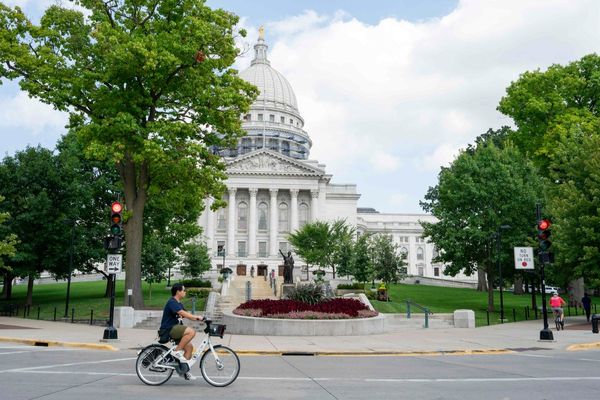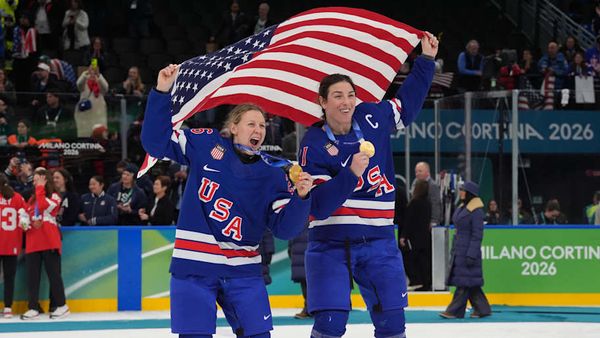PHILADELPHIA — Four candidates running for Philadelphia mayor each collected more than $800,000 in campaign contributions last year, but one hopeful has significantly more money in the bank than any other thanks to a check he wrote to himself.
New campaign finance reports show that former City Councilmember Allan Domb, a real estate magnate known as the “condo king,” lent $5 million to his mayoral campaign, meaning that at the start of this year, he had more money to spend on advertising, staff and expenses than seven other candidates combined.
Campaign finance reports filed by eight candidates this week provide the clearest picture yet of who among the large field of Democrats vying for the party’s nomination is best positioned to sustain a campaign through the May 16 primary election. And the filings show who each candidate leaned on over the course of the last calendar year to finance their nascent campaigns.
Besides Domb, three other candidates — grocer Jeff Brown, former Councilmember Helen Gym, and ex-City Controller Rebecca Rhynhart — each also raised more than $800,000. None are self-funding to the same level as Domb, but Brown, a longtime ShopRite proprietor, gave $240,000 to his campaign, and Gym kicked in $25,000 to her own.
State Rep. Amen Brown, who was the last of the group to declare his candidacy, brought in just $3,500 to his mayoral campaign last year.
Allan Domb invested in himself
In addition to Domb’s $5 million loan, he raised more than $700,000 in other contributions, and his campaign spent more than $1 million last year, allowing him to be the first candidate to air TV commercials. He entered 2023 with just over $5 million in the bank.
“Allan is also choosing to put his own money into this race, because he believes it’s critical that Philadelphians have a mayor who will provide the leadership needed to tackle the public safety crisis and create more opportunity in all neighborhoods,” Domb spokesperson Jared Leopold said. “Allan will never be beholden to special interests, unlike other candidates who are coordinating with SuperPACs to bolster their campaigns.”
Domb’s investment in himself triggered the “millionaire’s amendment” of Philly’s campaign finance rules, which allows all candidates in a race to collect donations worth up to double the usual cap if any candidate gives $250,000 or more to their campaign. That means all candidates can now take in contributions of up to $6,200 per year from individuals and $25,200 per year from political committees.
Domb waited until Dec. 30 to write himself the big check, which prevented his rivals from taking advantage of the increased donation limits last year.
Gym, Rhynhart have the most money in the bank
Besides Domb, Gym and Rhynhart reported having the most money in the bank, with Gym ending the year with about $1,031,000 and Rhynhart with $1,026,000.
Among Gym’s donors, one stuck out: the American Federation of Teachers’ political arm, which donated more than $112,000 over the course of the year.
That’s well in excess of the usual city contribution limit, which is $12,600 annually for organizations or political committees donating to a campaign. But the donations were made before December, when Gym officially declared her candidacy. Under the city’s campaign finance regulations, campaigns can accept “excess precandidacy contributions,” so long as the funds are segregated in a separate account.
Those funds can’t be used “to influence the outcome” of the election, according to the regulation. Shane Creamer, the executive director of the Board of Ethics, said those funds may be used to cover, for example, “exploratory” expenses.
Parker kept it local
Former Councilmember Cherelle Parker appears to have raised a greater share of her campaign money from Philadelphians than any other candidate, according to an Inquirer analysis of contributions reported this week.
Campaign finance filings only itemize contributions from donors who gave more than $50 during one year. About 68% of Parker’s contributions that were above that amount came from within the city limits, and only about 8% came from outside of Pennsylvania and New Jersey. Overall, Parker raised $547,000 last year, and had $460,000 in cash on hand at the start of 2023.
By contrast, only 35% of the donations listed in Jeff Brown’s report came from Philly, the lowest share of any of the candidates, according to the analysis, which excluded money the candidates donated to themselves. Brown raised a total of $847,000, excluding his own contribution.
Derek Green, a former Council member who developed political ties across the country through his involvement in groups like the National League of Cities, took only 41% of his itemized contributions from the city, the second-lowest share in the field. Green raised a total of $484,000 last year, and had $440,000 on hand to start 2023.
Rhynhart’s campaign paid a prominent endorser
Rhynhart spent a significant chunk of cash: a half a million dollars, which was largely used on office space, payroll, and polling.
Her campaign also shelled out to a handful of consultants, including one former mayor: John F. Street, who received a $22,000 payment from the campaign in November. And notably, Street endorsed Rhynhart during a news conference last month.
Rhynhart’s campaign said in a statement that Street is a senior adviser who works in the campaign office daily and is “compensated like any other consultant, advisor or staff member.”
Jeff Brown spending early on TV
Domb and Jeff Brown are the only candidates who have run television ads thus far.
But Domb spent more than $1 million in total and has plenty to spare, while Brown burned through more than half of his cash, spending in excess of $600,000 during the reporting period. Of that, more than $350,000 was spent on advertising and media production.
Brown raised more than $1 million in total during 2022. Other notable donors besides Brown include Bart Blatstein, a real estate developer, and Harold Honickman, who — alongside Brown — was one of the chief opponents of Philadelphia’s sweetened-beverage tax.
Quiñones Sánchez in the mix
As a longtime representative of some of the poorest neighborhoods in the city and a frequent foe of the Democratic establishment, former Councilmember Maria Quiñones Sánchez knew that one of her biggest challenges in the mayor’s race would be fundraising.
So she entered the race early and got to hitting up donors, allowing her to enter 2023 with a respectable $502,000 in the bank, an amount she hopes will eliminate any questions about her viability.
But it also leaves her behind the ball compared with candidates who have already spent significant amounts on advertising to boost their profiles.






